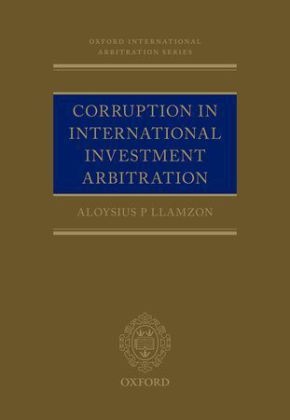Read more
This is the first comprehensive study of corruption in international investment arbitration. The book considers the limited effectiveness of efforts to combat transnational corruption in international law and the emergence of international investment arbitration as a singular means for effective control of corruption within the international legal order. The case law on corruption by investment tribunals is studied exhaustively, jurisprudential trends are identified, and reforms aimed at enhancing the effectiveness and fairness of investment arbitration as a mechanism to combat corruption are proposed.
Divided into three parts, part I focus on the phenomenon of corruption in foreign investment and attempts at its control through international law. Part II analyses the available case law in international investment arbitration dealing with corruption. Llamzon identifies nine distinct trends emerging from the case law and provides a table summarizing the key areas of corruption decision-making and each relevant tribunal's approach, which is an invaluable tool for practitioners engaging in 'live' issues of corruption within arbitral proceedings. Part III reflects on the implications of these trends for both the 'supply' and 'demand' sides of corruption in international law, and proposes a integrative framework of decision for corruption issues in international investment arbitration.
List of contents
- 1: Introductory Chapter: Arbitrating Transnational Corruption
- PART I: TRANSNATIONAL CORRUPTION AND INTERNATIONAL EFFORTS AT ITS CONTROL
- 2: The Nature of Transnational Corruption
- 3: A Typology of Corruption in Foreign Investment
- 4: International Efforts to Combat Corruption in Foreign Investment
- PART II: THE JURISPRUDENCE ON CORRUPTION IN INTERNATIONAL INVESTMENT ARBITRATION: CASE AND TREND ANALYSIS
- 5: The Scope of Inquiry: Treaty vs. Contract 'Investment Arbitration'
- 6: The Cases
- 7: Emergent Trends
- PART III: TOWARDS A JURISPRUDENCE CONSTANTE IN INVESTMENT ARBITRATION DECISION-MAKING ON CORRUPTION
- 8: Mere Corruption? On the Relectance to Decide Corruption Issues
- 910: Proving CorruptionState Responsibility for Corruption: The Attribution Asymmetry
- 11: Concluding Chapter: Legal and Policy Tentions Underlying Anti-Corruption Decision-making
About the author
Aloysius Llamzon, A.B., J.D. (Ateneo de Manila), LL.M., JSD (Yale Law School), is Legal Counsel at the Permanent Court of Arbitration in The Hague. Dr. Llamzon assists tribunals in inter-State, investment, and commercial arbitrations, including as Registrar or tribunal secretary. He is the Registrar of the Indus Waters Kishenganga Arbitration (Pakistan v. India). He was formerly an associate at the Hong Kong office of a leading U.S. law firm, a leading firm in Manila, and a lecturer in arbitration and international law at universities in Manila and Hague.
Summary
This is the first comprehensive study of corruption in international investment arbitration. The book considers the limited effectiveness of efforts to combat transnational corruption in international law and the emergence of international investment arbitration as a singular means for effective control of corruption within the international legal order. The case law on corruption by investment tribunals is studied exhaustively, jurisprudential trends are identified, and reforms aimed at enhancing the effectiveness and fairness of investment arbitration as a mechanism to combat corruption are proposed.
Divided into three parts, part I focus on the phenomenon of corruption in foreign investment and attempts at its control through international law. Part II analyses the available case law in international investment arbitration dealing with corruption. Llamzon identifies nine distinct trends emerging from the case law and provides a table summarizing the key areas of corruption decision-making and each relevant tribunal's approach, which is an invaluable tool for practitioners engaging in 'live' issues of corruption within arbitral proceedings. Part III reflects on the implications of these trends for both the 'supply' and 'demand' sides of corruption in international law, and proposes a integrative framework of decision for corruption issues in international investment arbitration.
Additional text
In sum, Corruption in International Investment Arbitration is an excellent resource that will be relevant not only to students of investor-state arbitration but to all those who have an interest in the legal and policy debates surrounding the efforts to combat corruption.
Report
This comprehensive book offers a probing examination of the relationship between investment arbitration and corruption, based on careful legal research and rigorous analysis. It is a fine piece of scholarship--the culmination of the authors doctoral dissertation--that is also grounded in the reality of arbitral decision-making, surely enriched by the years that the author spent as a lawyer at the Permanent Court of Arbitration. Joan E. Donoghue, Judge, International Court of Justice. ICSID Review

